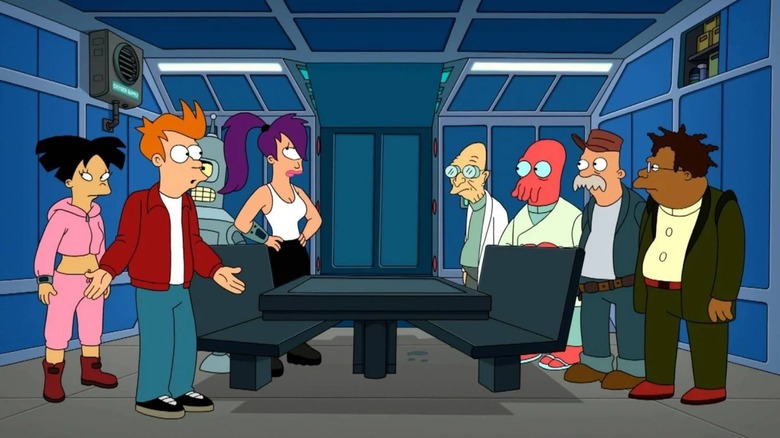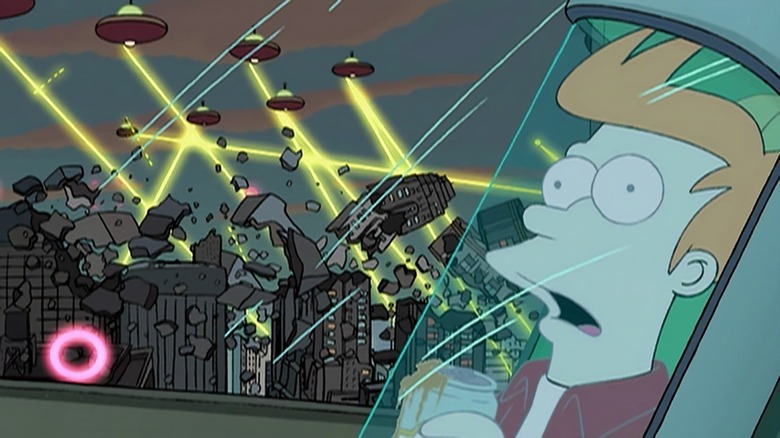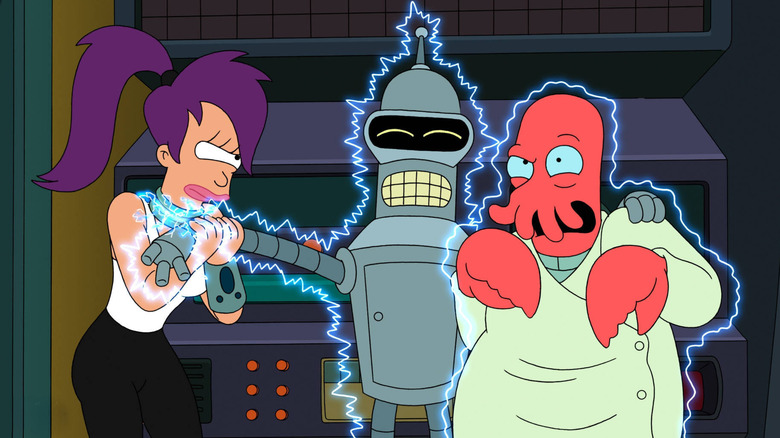Being Overprepared Is What Really Landed Futurama's Deal With Fox
The premise of David X. Cohen and Matt Groening's "Futurama" is pretty simple. On New Year's Eve in the year 1999, a feckless and directionless pizza delivery boy named Fry (Billy West) accidentally falls into a cryogenic freezing tube and remains suspended for a thousand years. He awakens just as the world rings in the year 3000, and eventually takes a job working for a distant nephew named Professor Farnsworth (West), who owns a space-bound delivery company of his own. He also develops a crush on an impatient cyclops named Leela (Katey Sagal). The world of the year 3000 is replete with sci-fi trappings familiar to any fan of the genre; there are robots, aliens, space travel, and ineffable technologies.
The central joke of "Futurama" is that, despite all of humanity's advancements, human beings are still dumb and petty and concerned with their selfish creature comforts and base impulses. Fry may have been whisked into the future, but he's still kind of an idiot. Luckily, there are plenty of idiots in the future he can relate to.
The series debuted in 1999, but the development of "Futurama" began many years before that. Matt Groening is the luminary behind "The Simpsons" and David X. Cohen was a "Simpsons" writer who began working on the show in 1993. Cohen is a credited writer on 14 episodes of "The Simpsons," including four of the show's celebrated Halloween specials.
Cohen, it seems, had gained a reputation as the "sci-fi nerd" in the "Simpsons" writing room, a reputation that opened up conversations about sci-fi — and a new TV series — with Groening. Cohen talked about these conversations in a 2015 interview with Lightspeed Magazine. By the time the two men were done constructing their new series, they were overprepared.
Word on the street is you're a nerd
Naturally, when Cohen caught wind that his boss — the man at the top of the pyramid, no less — was interested in making a sci-fi series, Cohen's ears perked up.
"I was a writer at 'The Simpsons' for five years, and four years into that, rumors started going around that Matt Groening was working on this secret science-fiction project. I was very interested, of course, being the SF/science nerd on the 'Simpsons' writing staff. Matt came to me and asked if I wanted to collaborate with him, and we started talking in our spare time, because we were both still working on 'The Simpsons,' on weekends and evenings about what we might do in 'Futurama.'"
This was a momentous occasion, as Groening hadn't created a show since "The Simpsons," and those were characters he had been working with since their debut on "The Tracey Ullman Show" in 1987. A decade hence, it was time to make something with robots and spaceships. Both Cohen and Groening, however, were deep-cut sci-fi nerds, and their bonding took, by Cohen's admission, way too much time. The worldbuilding "Futurama" took up massive cognitive space, and when it came time to pitch, Cohen and Groening overwhelmed the executives. Cohen said:
"A lot of it was just, 'What books do we like? What movies do we like?' This went on for a year, which was too much time in retrospect; when we finally went in to FOX Network to sell the show, we had too much stuff and the meeting went on for about two hours. I think they finally said, 'All right, that's enough! We'll take the show if you just shut up.' It ended up being a learning experience."
Lesson learned.
Putting the sci in sci-fi
Luckily, Groening and Cohen brought different sensibilities to "Futurama." Groening, previously a cartoonist by trade, was more interested in sci-fi books and movies, eager to share his enthusiasm for the old-fashioned entertainments he encountered as a child and as a teen. Cohen did the same but admitted that he was more interested in science than science fiction. It should be noted that Cohen possesses multiple degrees. He programmed video games and wrote an essay on "pancake sorting," a famous mathematical problem. Cohen is no mere pop culture geek. He's enthused about actual programming and study.
Cohen said as much in talking with Lightspeed, saying:
"I was mainly a science nerd; I'm an SF nerd in the sense that I like to read science fiction, but I was almost a scientist. I had two biologists as parents, I got my undergraduate degree in physics and I decided to go study computer science at UC Berkeley. I pooped out halfway through and ended up with a Master's degree instead of a PhD and started writing comedy spec scripts. It was a torturous, circuitous route to comedy writing."
Luckily, an animated series like "The Simpsons" needed a science nerd, and he filled the niche well. He also, surprisingly, found a compatriot. Cohen said:
"I had the science side pretty well cornered at 'The Simpsons,' until Ken Keeler showed up. He's another writer on 'The Simpsons' and, later, 'Futurama,' and he has a PhD in applied math, so his credentials are a bit better than mine. But he showed up too late to get in on the development stage of 'Futurama,' lucky for me."
"Futurama," despite several cancellations, is still on the air in 2024. Fitting for a man who possesses two degrees and is really, really funny.


